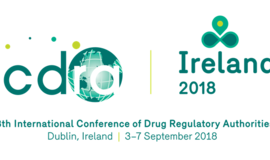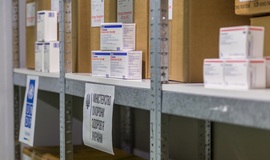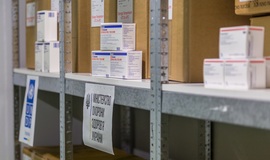News
Effective medicines regulations in Ukraine: the Health Ministry’s action plan to protect Ukrainians from unsafe and ineffective medicines
Improving the quality of health care and ensuring that Ukrainian patients are provided with safe and effective medicines are the strategic objectives of the transformation of the Ukrainian healthcare system. Therefore, the Ministry of Health of Ukraine introduces systematic regulatory changes to cut out the use of ineffective, poor quality, harmful medicines to protect and promote public health.
According to the data provided by the International Renaissance Foundation (IRF) and the Anti-Corruption Action Centre, last year Ukrainians spent about UAH 13.9 billion on medicines with doubtful or unproven efficiency, including homeopathic and herbal remedies, many of which are readily available and sold ‘over the counter’ in pharmacies nationwide. Approximately 26% of the money spent on medicines were wasted on ineffective and poor quality medicines. The detailed study results are available in Ukrainian.
A situation where citizens spend a fortune on medicines with doubtful or unproven efficiency is unacceptable and will not be allowed to continue, as the use of ineffective, poor quality, harmful medicines can result in therapeutic failure, exacerbation of disease, resistance to medicines and sometimes death.
Therefore, the Ministry of Health of Ukraine has started implementing the long-term systematic changes aimed at tackling the use of ineffective medicines, as well as promoting and protecting public health:
1. The National Essential Medicines List (NEML)
Ukraine has implemented the updated version of the National Essential Medicines List (in Ukrainian), having expanded it to 427 INNs, to satisfy 100% of the priority health care needs of the population and to ensure the availability of essential medicines in sufficient amounts at any time in hospitals nationwide.
In addition, the Ministry launched the Liky Control mobile application (in Ukrainian) allowing patients to check whether certain medicines are included in the state-guaranteed NEML or available in stock at a particular hospital, and are to be provided free of charge.
2. International procurement
In 2015, Ukraine adopted the Law on procurement of medicines and healthcare products through specialized international organizations, and this system has already proved to be efficient and transparent, including by providing more patients with high quality medicines.
For the fourth consecutive year, the Ministry of Health of Ukraine cooperates with the United Nations Development Program (UNDP), the United Nations Children’s Fund (UNICEF) and the UK procurement agency Crown Agents to improve public procurement of medicines and healthcare products. In 2018, these international organizations procured about 500 types of medicines and 800 types of healthcare products under 40 government programs worth a total of UAH 5.9 billion.
3. International clinical protocols and evidence-based medicine
The Ministry of Health of Ukraine has selected and introduced internationally recognized clinical guidelines and protocols to be applied by Ukrainian doctors as standards of medical practice. The use of international protocols, which define a disease and specify how to treat it, will help standardize care to ensure that each patient receives appropriate treatment in a timely manner. In addition, patients can use these protocols as a tool to control the quality of care provided by physicians.
The Ministry has already purchased licenses for the Evidence Based Medicine Guidelines, developed by the Finnish Medical Society Duodecim. The first 150 of which are being translated into Ukrainian for use by doctors.
The guidelines for diagnosis, treatment, and prevention of the most common diseases are currently available in English on the Ministry’s website.
4. The Agency for Health Technology Assessment
The Ministry of Health of Ukraine plans to adopt one of the world’s best practices and works on the establishment of the Agency for Health Technology Assessment. The Agency will be responsible for the systematic evaluation of properties, effects, and/or impacts of health technologies in the form of medicines, medical devices, vaccines, procedures and systems developed to solve particular health problems and improve quality of life.
The Agency’s experts will conduct such assessments, compare the data and inform the policy decision makers of the results to help them achieve the rational use of both the procured medicines and the allocated funds from the state budget. Based on the Agency’s recommendations, the Minstry of Health of Ukraine will update the public procurement nomenclatures and the National Essential Medicines List.
5. eHealth and e-prescribing
The implementation of the electronic prescription system is an important step in the eHealth development. This system will eliminate paper prescriptions and simplify many planning, statistical and logistical processes. Moreover, the integration of e-prescribing functionality into eHealth will allow effective and transparent prescription of safe and effective medicines, which will in turn contribute to improving access of Ukrainian patients to high quality medicines and ensuring the continuation of treatment.
6. The draft Law abolishing special permits for traditional medicine practice
The Ministry’s draft Law On Amendments to Some Laws of Ukraine excludes Article 74.1 from the Fundamentals of the Legislation of Ukraine on Health Care. This Article regulates the procedure of issuance and revocation of a special permit to practice traditional medicine (healing), including the issuance of an expert conclusion on person’s healing ability by the Ministry of Health of Ukraine.
The Cabinet of Ministers of Ukraine has already approved the draft Law and the Ministry hopes that MPs will introduce the draft Law to the Ukrainian Parliament in the near future, as the amendments will enter into force once the Parliament approves the draft Law.
7. The draft Law on pharmaceutical advertising
The Ministry of Health of Ukraine has initiated the improvement of national policies regulating advertising of medicines and healthcare products to establish rigorous control over the pharmaceutical advertisement content to prevent all sorts of manipulation of information about the advertised product and its properties.
The draft Law envisages new advertising content restrictions developed in accordance with the relevant European guidelines. In particular, new rules will prohibit the use of any links or references to disease diagnosis or treatment planning conducted over the phone or online, the advertising of medicines by celebrities or actors playing the role of medical professionals, and the use of any information indicating that a particular medicine is intended exclusively for the treatment of children.
A separate item in this legislative initiative suggests prohibition of advertising traditional folk medicines and healing practices.
The Ministry of Health of Ukraine is currently finalizing the recommendations and feedback received during a series of public consultations.
8. Professional licensing of doctors
The Ministry of Health of Ukraine has developed the Concept for Licensing of Healthcare Professionals in Ukraine, which provides for the introduction and implementation of a national medical licensing system aimed at regulating access to the medical profession.
The Concept provides for a new approach to training of those entering the profession, starting at the stage of admission to a medical school, and a transition period for all practicing healthcare professionals. Therefore, upon graduation from a medical school and/or completing internship or residency, those entering the profession will take an exam to obtain a professional license, which will require continuous training and a renewal every three years. All practicing doctors will also have to pass a licensing exam.
The Concept also envisages the establishment of the Licensing Board, which will ensure that all practicing physicians have appropriate education and training, and that they abide by recognized standards of professional conduct while serving their patients.
Professional licensing should contribute to improving both the quality of health care and the level of public trust in the medical profession.
The Ministry of Health of Ukraine emphasizes that the protection of Ukrainians from poor quality and ineffective medicines is one of the priorities of the ongoing transformation of the national healthcare system. This requires the current and future policies to focus on the most effective solutions and to follow an integrated approach in medicines regulations.



